7+ SAMPLE Sports Coaching Proposal
-
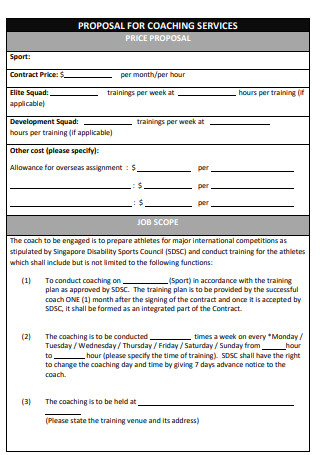
Sports Coaching Service Proposal
download now -
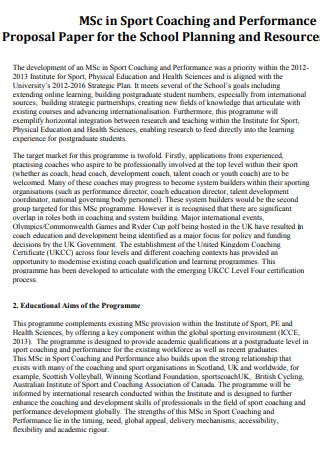
Sports Coaching Performance Proposal
download now -
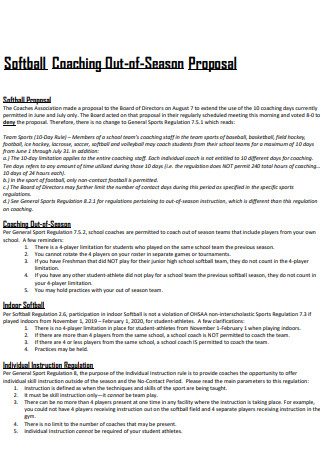
Simple Sports Coaching Proposal
download now -
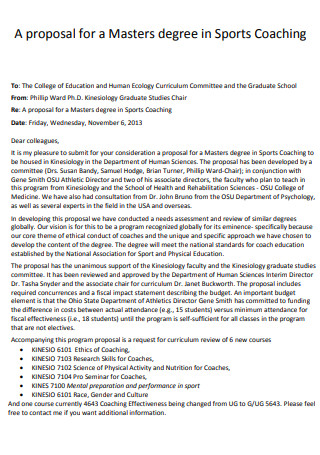
Master’s Degree in Sports Coaching Proposal
download now -
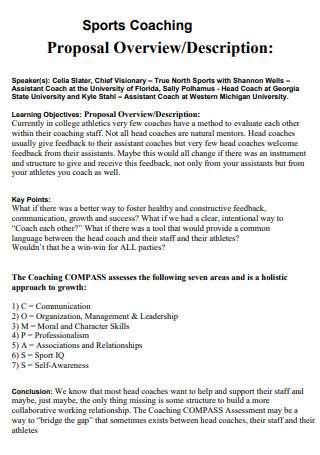
Sports Coaching Proposal Overview
download now -
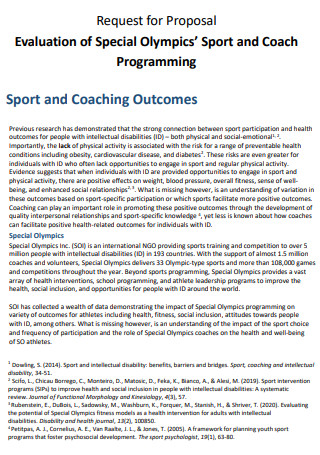
Special Sports Coaching Proposal
download now -
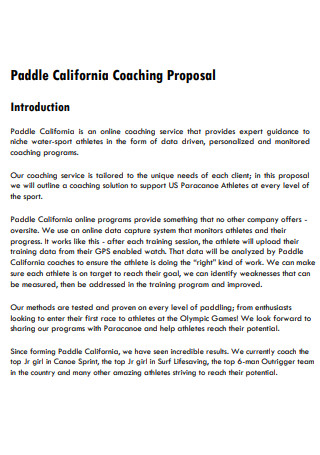
Sports Coaching Proposal Example
download now -
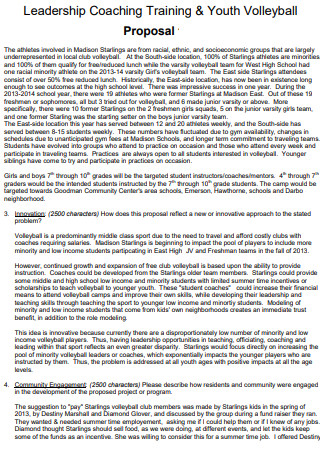
Volleyball Coaching Proposal
download now
FREE Sports Coaching Proposal s to Download
7+ SAMPLE Sports Coaching Proposal
a Sports Coaching Proposal?
Benefits of Coaching Young Athletes
Tips On Having a Successful Coaching Skills
How To Promote Improved Athletic Coaching
FAQs
What services do sports coaches provide?
What factors contribute to a coach’s success?
Why is it necessary to have a coach in sports?
What Is a Sports Coaching Proposal?
A coach’s role is critical in an athlete’s life. They function as sports educators and set the circumstances for learning to occur and motivate the athletes. Because most athletes are highly driven, the objective is to sustain that motivation while generating excitement and enthusiasm. Professional and even municipal or small league teams become ineffective without a coach to assist them. Indeed, they are the driving force behind every athlete’s success, making being a coach by trade a valuable career path, but not without its hurdles. A background check and assessment of skills and knowledge in the particular sport are required to join the correct association or be linked with the proper athlete. Thus, selecting the coach of the appropriate sport would include submitting a sports coaching proposal. This document outlines the talents and knowledge of a sports coach, an assessment of the client’s sporting demands and requirements, the specific benefits the client may be expected to attain, and a definition of a successful program. Coaches account for around 20%-30% of the difference in a team’s success. However, coaching impacts vary significantly between situations and results.
Benefits of Coaching Young Athletes
Accepting a position as a young sports coach entails a significant commitment. You should anticipate spending many evenings a week with the team. And how about your weekends? Games and tournaments may supplant them. Additionally, you will have to cope with your parents. What are the benefits of volunteering as a coach? Continue reading to learn six gratifying perks of teaching children sports.
Tips On Having a Successful Coaching Skills
Each sports coach is unique. While some are adept at following established protocols, others experiment and test new methods, allowing them to be creative and develop their coaching styles. I cannot say whether the way is superior Because I’ve seen numerous examples of both that work well. Whatever type of coach you are, we all agree that effective coaching is critical for athletes to execute at their best when it counts. As a coach, you are obviously in a position of power; yet, be cautious not to inadvertently utilize this position to produce athletes who are wholly reliant on you – you want to empower them and instill confidence and advancement in them. You cannot force athletes to do something they do not want to do for an extended time. While a coach can impose his will on them for a time, an athlete must be self-motivated to reach their full potential – given enough desire. They can achieve practically anything. Coaches are far too often preoccupied with the details of the sport and training strategy. However, the coach’s ultimate goal is to alter their athletes’ behavior. The coach has no authority to tell an athlete what they can or cannot accomplish. A coach can only create an environment where they can discover this for themselves – an environment that ensures success. The following are four behaviors of sports coaches that will assist you in getting there.
-
1. Establish a clear, receptive atmosphere
While developing their program, a successful coach would have considered what they believe is critical — their expectations of their athletes and any other coaches they may work with. They accomplish this by stating what behavior they demand from themselves and others. They will be explicit about this and cannot afford to be passive. Each squad member or team member must clearly understand what they are purchasing. A wise coach will recognize that their setting will not suit everyone. You should, however, ensure that your staff understands what you’re doing and why. Your environment and culture must be open and welcoming. Performance reports can be highly beneficial in this situation — regardless of your athletes’ confidence level. Also, showing them their performance history and quantifiable data and discussing what it will take to drive the needle from where they are now to your shared goal instills confidence in achieving it and establishes a healthy, transparent relationship.
2. Construct a contract
Frequently, coaches will sign contracts with their athletes. It may not always be in writing, but they will always be very clear about what they are attempting to accomplish. They do not have to share the same objectives, but they require a legal basis to work from. Occasionally, the goal is not as obvious, and the athlete may lack confidence in committing to it – they may not even vocalize it for fear of failing to accomplish it. A coach must exercise caution, in this case, to avoid assuming they are on the same path. If the coach and athlete do not communicate honestly and clearly about their respective positions, tension, misunderstanding, dissatisfaction, and bad outcomes will occur. With this in mind, if you find your athletes are having difficulty committing to or feeling confident about attaining the goal you’ve set, it’s a good idea also to set smaller targets that contribute to your more extensive plan. This way, anytime you accomplish a modest goal, your team will gain confidence – each accomplishment moving them closer to your larger goal and simplifying the process and work required to complete it.
3. Determine the appropriate tone
Immediately, there is an imbalance of power between coach and athlete. Unexperienced coaches are prone to developing a parent/child bond with their athletes. This can be detrimental. Either response may be ineffective. If they do not respond and develop into passive subservient athletes, this may be beneficial because they accomplish what they are told. Still, it will prevent them from developing into complete athletes. With a more vocal responder, a coach may receive an aggressive answer, prompting the coach to respond poorly to avoid being challenged in front of their athletes. A skilled coach will be able to spot and defuse these situations before their escalation. The most effective coach-athlete partnerships are ‘adult’ to ‘adult.’ This is when the balance of power becomes critical. The coach must take the initiative to elevate the connection to an ‘adult to adult’ state. Even if the other party misbehaves, the coach will act appropriately. By demonstrating this behavior, the athlete will invariably change their mind.
4. Permit failure
Effective coaches foster an environment conducive to risk-taking within their programs. They ensure that players need not fear being penalized for making a mistake. This can be challenging, especially when athletes know that selectors observe. Athletes must improve to perform. They must learn to improve. They require unique thought and emotional connection to learn well. Or, in other words, a possibility of ‘failure’ – they must be capable of failing. A successful coach creates an environment conducive to failure. When they do forget, the support to learn is immediately available. The same atmosphere must also encourage them to achieve. While the coach generates possibilities for achievement, the coach also provides learning support.
How To Promote Improved Athletic Coaching
Coaching is a gratifying yet demanding vocation. Having tactical abilities and knowledge of a sport does not qualify you as a competent coach. As a coach, you are a combination of educator, strategist, and counselor. As an athletic director, you are responsible for leading your staff of coaches and ensuring their performance. Self-development can significantly impact your effectiveness, regardless of the sport you teach. The following are five strategies to improve as a sports coach.
-
1. Acquire the ability to develop practical goals.
Creating measurable goals and expectations is critical to successfully managing a team. Plans should include more than just raising victory totals. Training meetings and academic objectives will boost your team’s overall performance. Setting demanding but attainable goals might help an entire group perform better. Plans do not have to be long-term to be effective. Consider establishing practice- or even drill-specific objectives. Communicate these goals to each kid you coach and explain why you chose a particular target. Instilling in young athletes the ability to define and attain goals is one of the most critical talents you can impart as a coach. Objectives do not have to be fixed in stone. As improvements are made or new challenges emerge, goals can be changed to account for these developments. It is critical that your objectives are precise and that everyone on your team understands their role in accomplishing them. Additionally, it might be beneficial to establish goals for each athlete you work with and tailor these goals to their specific needs and strengths.
2. Establish a team culture
Athletes frequently perform better when they experience a sense of belonging. Creating and sustaining a positive team culture can help keep athletes motivated and synergistic. A culture is essentially the embodiment of a coach’s ideology. If the emphasis is exclusively on winning, teams become fractured, and coaches and athletes feel frustrated. Negative attitudes, unhealthy competition, and bad sportsmanship can contribute to a program’s demise. Find strategies to communicate your team’s strengths and individuality. Encourage each team member to embrace the team’s identity and take satisfaction in being a part of something greater than themselves. Even if you coach an individual sport, you may assist your participants in seeking out camaraderie, encouraging one another, and competing effectively.
3. Consistently provide feedback
Feedback comes in various forms, but athletes have no idea what to continue doing or how to develop without it. Remember that feedback is not always verbal. Athletes are very perceptive of frowns and aggressive body language. Young athletes lack an innate understanding of what it takes to achieve at their best, which is where constant feedback comes in. This feedback should be constructive as well as positive. It can be challenging to focus on the positives following a loss. Athletes rarely develop by yelling and receiving severe feedback. This is not to state that mistakes should be overlooked; instead, they should be used for instruction rather than punishment. Athletes are all humans, and their responses vary considerably. When feasible, feedback should be tailored to the individual. Some people thrive on being applauded in front of a crowd, while others thrive on receiving comments one-on-one. Even if not all team members perform at the same level, finding measures to promote individual growth can increase togetherness.
4. Maintain a healthy sense of perception
When surrounded by rivals, it’s easy to lose perspective. Distracted by the importance of a huge game or the loss of a key player, the distraction might become overwhelming. Good coaches realize how critical it is to keep the game in perspective. Each athlete who takes part in a sport gains something. You may optimize the prizes for each team member. Allowing your self-worth to become entwined with a team’s performance diminishes the athletes’ efforts. Being a coach is only one facet of your personality. Along with guiding athletes in a sport, you teach them how to deal with success and failure.
5. Never stop learning
A coach’s ability to enjoy the technical aspect of a game is critical, and the best coaches are constantly learning about the sport they love. As with the athletes you work with, honing your talents will result in positive progress. Reading, furthering your education, seeking out resources, and learning what works in other programs will help you better your game, benefiting the athletes you coach.
FAQs
What services do sports coaches provide?
Sports coaches develop ability by identifying needs and the assessment implementation of appropriate training programs. Regardless of the environment, coaching entails enhancing participants’ physical and psychological fitness and creating the optimal practical conditions for optimal performance.
What factors contribute to a coach’s success?
An effective coach communicates well and has a strong sense of credibility, competence, respect, and authority. You should be able to define things clearly. Clear communication means setting clear goals, giving clear feedback reports, and reinforcing the main points. Good communication is also essential if you want to be heard.
Why is it necessary to have a coach in sports?
Coaches are uniquely qualified to assist players in reaching their full potential. They also play a critical role in encouraging children and adolescents to participate in sports and physical activity. Sports coaches are excellent at promoting active lifestyles, inclusivity, and physical activity participation.
Throughout the years, numerous outstanding players whom we have come to know to owe their sporting careers to their sports coaches. Therefore, begin composing your sports coaching proposal and contribute to developing an athlete’s life.
